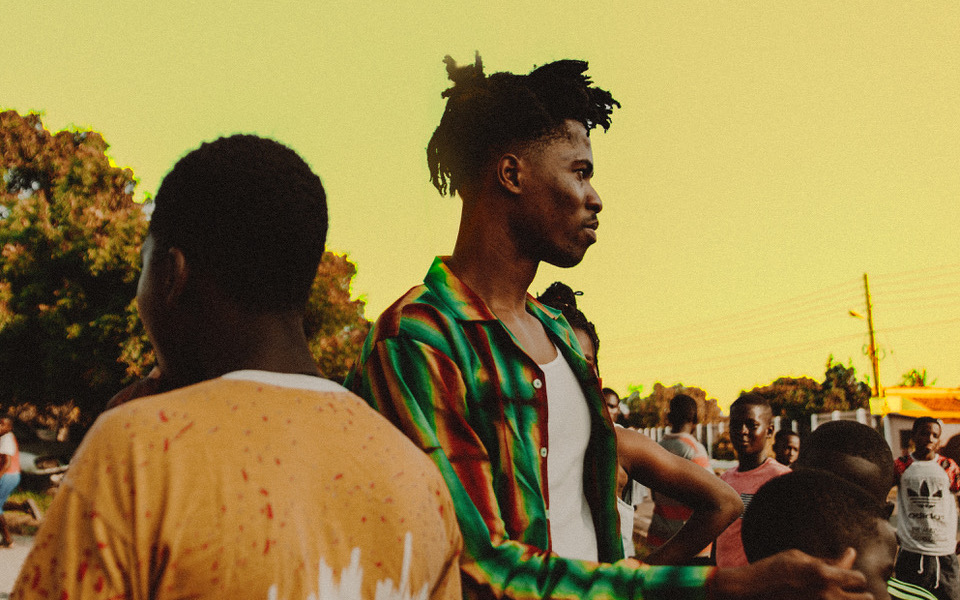
With his debut album, Son of Jacob, out now, we speak to Ghanaian superstar Kwesi Arthur about telling the story of his homeland, turning down a security job and why he’s nicknamed ‘the hustle manifested’.
Love him or loathe him, there’s one thing you can’t deny Kanye West: self-belief. In the recent and, by all counts brilliant documentary, Jeen-Yuhs, you see a young man with the determination of a high-performance athlete in a major final; a will power with which he convinced Roc-a-Fella Records of his rap credentials, overcame a car accident and the death of his mother, and transitioned into the world of fashion. The first episode is called “VISION” for a reason.
For many of us mere mortals, self-belief nowadays is more of a façade; we think we can be supported in what we do by a wealth of knowledge at our fingertips. You can watch a Ted talk and become smarter; a full body transformation and become a health obsessive; someone smoke a spliff with Joe Rogan and become a modern-day philosopher.
One person who hasn’t been fooled, though, is Ghanaian rapper Kwesi Arthur. The road to his studio debut album, Son Of Jacob, which dropped two weeks ago, is testament to the genuine self-belief he has. It tells the story of his journey from Tema, Ghana’s largest seaport, situated on the southern coast, to becoming one of the country’s most promising artists.

“The first thing for me is telling my story and being able to be who I want to be – the vision of myself within the music – and taking that to the highest level,” he says. This story, he adds, represents “the struggle of the people”. The album’s title, too, speaks to Kwesi’s ancestry, relating to his Akan Ghanaian ethnicity – a group whose history is often traced to the Israelites in the bible.
Kwesi’s introduction to music as a means of self-expression came through in pertinently divine ways. “We had an agriculture class, but it was raining. So I took some time out and spent the time writing my first verse. I performed it to my friends later that day and they said, ‘Yo, chale’” – a term that means ‘friend’ in Ga, the Kwa dialect spoken in Ghana – “‘whose verse are you rapping?’”
“I said, ‘chale, if you think I stole this rap then it means I have something.’ So from then on, I started writing more and getting more into it.” Spurred on by Drake’s Thank Me Later, given to him by a friend, Kwesi would continue to use rap as a means to capture and tell the story of the world around him.
“Listening to [Drake], his cadences, how he put his verses together, the stuff he talked about, I thought it was personal to him. He was telling me a story and making me feel a part of his story.
“So I thought it would be dope and that I could do it too and talk about our story – because nobody was really speaking from our perspective as Tema people, growing up in the kind of environments we grew up in. So I thought I can this story with people.”
Indeed, his life hasn’t been without challenges. After completing secondary school, his family’s inability to afford his school fees meant he was unable to register for the University of Ghana in Accra, the nation’s capital.
Undeterred by this setback, Kwesi got himself a job at a local studio by striking a deal with the owner. “I went to talk to him about me cleaning up the place and managing it,” he recalls, “and then I got a chance to learn how to record and produce. So from 2013, I started recording heavily.”
As with many artists, the pull of a more stable job (and income) was strong. At one stage, largely on the advice of his mother, Kwesi applied for the role of a security guard.
“I passed and everything. Later they called me, and I was like, ‘actually, this isn’t something I want to do’. When I was there, I saw this guy who was my age, and could see the expression on his face. He wasn’t enjoying what he was doing – and that’s not how I want to live my life. Luckily, the owner of the studio came back, and I said, ‘yo, chale, let me work with you again, this security job isn’t for me.’”
The real turning point for Kwesi came in 2015 when he met the group Ground Up Chale – who became a chale to him in many ways. A creative incubator for emerging Ghanaian talent, with as much ambition to make Tema heard as Kwesi, Ground Up had an influential YouTube channel and a recording studio. This allowed Kwesi to drop tracks and freestyles, eventually culminating in his first major breakthrough as an artist, ‘Grind Day’.
As its title suggests, it tells Kwesi’s hardworking experiences – every day of the week, every day of the grind – over warbling bass that’s as heavy as the track’s message.
“Before we dropped ‘Grind Day’ on the EP, Live from Nkrumah Krom, I’d been dropping freestyles and people were gravitating towards it. So when we dropped that EP, it was perfect timing. ‘Grind Day’ was infectious – that’s how it felt to me, coming into contact with people who told me about it. Everywhere you go people were saying [the lyrics], “Monday, yeh, yeh / Tuesday, yeh, yeh.’ The love towards it was crazy.”

As well as a hit, it was also the start of a major theme in Kwesi’s work: an overcoming of strife, of making something from nothing. It’s little wonder the rapper was once nicknamed ‘the hustle manifested’ – a phrase I repeat to Kwesi, who laughs before responding with a mixture of humbleness and understanding.
“I’m just like every other ordinary African youth. Where we’re from, there aren’t that many opportunities for us to make it out. I’m grateful I chose this path and it’s turned out how it’s turned out. But we put the work into it… I didn’t just appear out of anywhere. People have seen me go through the stages to be here.
“That’s why maybe that tag is put on me. We’re doing this to prove to ourselves that we can make it. We want to be great people and influence people from where we’re from because it’s not easy being from where we’re from.”
It’s this sentiment, then, that cuts through on Son of Jacob. The album opens with the vigorous ‘Drama’ where Kwesi speaks of doing “overtime… tryna get rich” and ultimately wanting “no drama”. He’s come too far, and worked too hard, for that.
The highly danceable ‘Baajo’, featuring Nigerian singer Joeboy and released as a single toward the end of last year, has been receiving a lot of praise (and listens). Yet the album really excels when Kwesi once more speaks of the hard times he’s been through to get to where he is.
‘Silver Spoon’, for instance, talks of being born without the track’s namesake, as well as Kwesi having lost his grandma last October – who’s watching over him “through the good and the bad times”.
Dovetailing the songs of struggle are the ones that embody that same key ingredient: self-belief. ‘Paper’, for instance, is a positive tune of financial success but still talks of “working Sunday to Sunday” to obtain it.
‘Diamonds Dancing’, meanwhile, has one of the most relatable lines in the whole album – “I ain’t going back no way / Fuck living off minimum wage” – spoken by the featured East London group, NSG. The album has another British feature, too, in the form of M Huncho on ‘Jungle Music, Pt. 2’.
Showcasing the album’s slick production and high-energy feel is ‘Winning’, featuring the “super hard and super talented” Vic Mensa, who is half-Ghanaian. Its hard-hitting bass and rapid repetition of its title emits that self-belief onto its listener too.
Overall, it’s an album of triumph; of overcoming the hand dealt to you in life with joy and ‘Celebration’ (one of the track’s title) along the way.
Perhaps it’s now commonplace for driven rappers to chart their journeys on camera too. Kwesi has a documentary (albeit far shorter) on the making of Son of Jacob. In it, you see an ambitious young artist with an abundance of self-belief. Sound familiar?




